Protecting Wild Fish from Poaching on the Olympic Peninsula: WSC’s Ongoing Support of WDFW Law Enforcement
A poacher wearing a headlamp uses a dip net at night to illegally take salmon in an image captured on one of the game cameras donated by the Wild Steelhead Coalition.
By Gregory Fitz
In March, not long before the Covid-19 pandemic temporarily shut down Washington’s fishing season, photographer and Wild Steelhead Coalition (WSC) board member Ed Sozinho and I spent a day floating the lower Sol Duc River with Sergeant Kit Rosenberger, a Washington Department of Fish and Wildlife (WDFW) Law Enforcement Officer stationed on the Olympic Peninsula.
We’d gotten to know Rosenberger a year earlier when he’d given a presentation to the WSC’s Board of Directors about ongoing poaching and enforcement challenges on the Olympic Peninsula. The board knew poaching remained a problem, but were blown away by the scale of the challenge. We wanted to know how to help. With support from our partners at Outcast Boats and Sawyer Oars, and our generous members, the WSC purchased and donated a new raft, oars, scopes, and game cameras to the OP Law Enforcement team to assist their efforts to monitor and patrol the OP’s iconic rivers. We handed this first batch of equipment to Rosenberger at our winter party at Emerald Water Anglers in Seattle in December 2019. At the time, we promised to head out to the OP later that Spring to see how the donated equipment was being utilized and learn more about the important work WDFW Law Enforcement does to protect Washington’s natural resources.
Sergeant Rosenberger and Greg Fitz on the Lower Sold Duc River with the raft and oars donated by the Wild Steelhead Coalition.
Thousands of Square Miles
WDFW Law Enforcement Officers working on Washington’s Olympic Peninsula face a daunting landscape of remote wilderness, dense forests, and wild rivers. There are usually only a half dozen of them to cover all of Jefferson and Clallam Counties (an area of 4800 square miles), hundreds of miles of rivers stretching from the southern end of Hood Canal and wrapping all the way around to the Quinault River, and a thousand additional square miles of saltwater jurisdiction off the coastline.
While six law enforcement positions are assigned to this vast area, turnover and budget constraints often mean there are actually fewer than that working during a given time. Right now, in December of 2020, there are only four Officers handling this entire region.
The Officers are responsible for monitoring activity and enforcing the laws governing freshwater and saltwater sport and commercial fisheries, hunting seasons, some environmental permits, tracking commercial fish and shellfish sales and sourcing for restaurants and markets, illegal logging, orca sightseeing boats, and camping where it isn’t allowed. Additionally, as fully commissioned law enforcement Officers, they assist with driving violations, drug arrests, and any other crime or illegal activity where they are required to intervene. For example, years ago on Rosenberger’s first day on the job, he and his mentor joined Washington Police and State Patrol in a car chase pursing a suspect following a bank robbery.
Because of the vast area they must cover, WDFW Law Enforcement Officers stationed on the Olympic Peninsula are often working alone by necessity. They do try to pair up if a known situation could be dangerous, but staffing constraints often limit this. Most people hunting and fishing legally, and illegally, are armed with firearms, knives, fish clubs, and/or gaffs and Officers must be mindful of this at all times. Whenever possible, the Officers collaborate with other agencies to expand their reach. For example, they might work with the Coast Guard to monitor Salmon, crab or ling cod anglers in the saltwater or pair up with tribal Officers on the Hoh or Bogachiel rivers. Recently, after a tip from local anglers, WDFW agents collaborated with Federal National Parks Agents to monitor, and eventually arrest, an angler who was catching wild Steelhead on the Lower Hoh, keeping some of them (which is illegal on the Olympic Peninsula), and cutting off the adipose fin on others before kicking the fish back into the river.
Approaching anglers on the Sol Duc River.
Every day the law enforcement team on the OP must make tough decisions on how and where to best focus their effort across this vast area. This decision is often made according to season, but they simply can’t be everywhere at once. The small team simply has too much ground and water to cover. Often, tips and insights from the public are crucial to helping Officers focus their attention where it is needed most. Neighbors reporting gun shots out of season has led to the capture of elk poachers. Fishing guides finding hidden gill nets have led to the arrest of illegal Salmon fishing at night. Calls from commercial and tribal fisherman have uncovered networks of criminals stealing crabs from recreational pots at night and selling them illegally to unethical fish buyers.
Even with dependable information from the public, a tip usually leads to long hours of monitoring and observation before any action can be taken. Often Officers must do this alone. And because poachers and criminals often operate at night, WFDW Law Enforcement Officers are frequently posted on stakeouts or using the cover of darkness to catch illegal snaggers, netters, and poachers. Rosenberger had many stories of launching a boat in the dark, or moving through the woods long before first light, or waiting for days to gather observations of illegal activity, in order to catch poachers operating at times or in places they thought they couldn’t be discovered.
Other times, evidence of serious lawbreaking appears suddenly. Routine stops on the river escalate or expose illegal activity far beyond the use of a barbed hook or an angler not having a current fishing license. Rosenberger explained that sometimes they ask an angler for their identification and learn that the person has outstanding warrants for their arrest. Sometimes they ask to see someone’s fishing license and the person immediately takes off running because they know they are hunting or fishing illegally or have illegal drugs or firearms in their possession.
Rosenberger told us a story of talking to a group of anglers who told him they’d only caught a small sea-run cutthroat when asked how fishing had been going. The anglers had a large gaff on the bank that was covered in blood and fish scales. Rosenberger knew a small cutthroat wouldn’t have made such a mess so he kept looking around and asking if they were sure that was the only fish they’d caught that day. He eventually found a pair of dead wild winter Steelhead they’d caught and hidden in the grass nearby.
Rosenberger emphasized that most anglers and hunters Officers encounter are law-abiding citizens who are responsibly enjoying their time on Washington’s public lands and waters. Each year, Officers cite a few of these anglers here and there who are still using bait, or fishing with barbed hooks, or have kept a fish illegally, are guiding illegally, or are fishing when the season is closed. These infractions are consequential, especially when they involve fish being killed, but the worst offenders are the ones Rosenberger calls the “One Percent.” These are poachers who are working on a large scale, or are repeat offenders, or are involved with schemes to sell fish, game or timber, often to raise money for drugs. These are the poachers with the largest detrimental impact on our fisheries and shared resources, and the ones Law Enforcement Officers work the hardest to find and stop.
Sergeant Rosenberger trades notes with John McMillan.
A Day on the Sol Duc
Winter steelheading can be a cold and wet endeavor, especially on a place like the Olympic Peninsula where the rain is often relentless. Sozinho and I lucked out when we floated the lower Sol Duc with Rosenberger. It was a warm sunny day, perfect for a boat ride in the new raft the Wild Steelhead Coalition had donated a few months earlier. Our plan was to spend the day hearing more about Law Enforcement’s work on the OP in between stops when Rosenberger checked the gear and licenses of Steelhead anglers.
Rosenberger’s stories were fascinating and eye-opening. Every section of the river seemed to trigger an anecdote. Some were hilarious: anglers fishing out of season who panicked and threw their rods in the river when approached by Officers, or anti-government anglers screaming about their refusal to buy a fishing license, or a woman celebrating her husband getting caught fishing with too many rods - all with barbed hooks - and keeping too many Salmon. Turns out they had a longstanding agreement that whatever amount he was fined she would spend a matching amount on anything she wanted because she’d been warning him for years that he was eventually going to get caught breaking the law.
Other stories were far more frustrating. Rosenberger pointed out multiple places where his team had caught, or found evidence, of poachers setting up illegal gill nets at night and killing huge numbers of Salmon and Steelhead. Or places where they’d caught snaggers multiple times. We all marveled at how often this selfish behavior occurs, its impact on fish populations, and the challenge of staying ahead of it when there are so many miles of river to cover across the Olympic Peninsula. Perhaps most ominously, we also talked about how often poaching must occur undetected for each time the small number of Law Enforcement Officers working on the OP are able to capture greedy offenders.
Over the course of the float, Rosenberger stopped and checked a number of anglers. The first happened to be our friend John McMillan, the lead scientist for Trout Unlimited’s Wild Steelheaders United program. We traded notes about the continued low Steelhead returns on the peninsula rivers and the tough fishing season. Between his scientific work and his time as an angler, McMillan spends a huge number of days on the water. He was happy to see Rosenberger because the day before he’d found the carcasses of multiple wild Steelhead killed by a poacher on a nearby river. He gave directions to the specific place and Rosenberger took careful notes, promising to investigate it immediately. He gave McMillan the direct phone number of a local enforcement colleague and reminded all of us that this was exactly the sort of tip that often led to poachers being discovered and arrested.
Later in the day, we stopped a group of anglers visiting from Oregon. Their gear and licenses were good, they had the proper number of life jackets in their boat, and Sozinho and I witnessed another important benefit of having Law Enforcement Officers on the water. The anglers were asking about upcoming rapids on that section of the Sol Duc and Rosenberger provided instructions on their locations and the best path through in a raft. The anglers said they were thinking about fishing the Hoh the following day and had a number of questions about the various sections to float. Rosenberger reminded them that fishing out of a boat was prohibited upriver of Morgan’s Landing. He also warned them about a place where a fallen tree meant they’d need to portage and another spot where the Hoh’s channel had changed during recent high water. They thanked him for the advice as we pulled away.
Sergeant Rosenberger checks fishing licenses and offers advice about upcoming rapids.
When we were out of earshot, I asked Rosenberger how often he encountered anglers from outside of Washington. He laughed and admitted that before he was stationed on the Olympic Peninsula, he hadn’t realized how popular the wild winter Steelhead fishery had become. Just the week before, he said he’d talked to anglers visiting from California, Idaho, Oregon, a couple of Midwestern states, someone from New Hampshire, an angler from Japan and two guys visiting from the United Kingdom.
We stopped and talked with a handful of other anglers during the rest of the day. Fortunately, everyone was in compliance with Washington laws. Notably, we were able to approach every angler quite closely before Rosenberger announced that he was with WDFW Law Enforcement. This advantage of surprise was a key reason why the Wild Steelhead Coalition had worked to donate the new raft and oars.
Previously, for a number of reasons to do with government budgets and timelines, Rosenberger’s team had been using a purple raft to patrol the OP’s rivers. For a while they’d been able to catch a number of people fishing illegally, but word quickly spread in the community, especially among the guides who were on the river every day, that the game wardens were the people in the purple raft. Rosenberger started noticing that whenever he would float around a river bend he would see folks reeling up and acting suspicious in the distance. He suspected they could be mashing down barbs, or ditching bait, or getting rid of fish they’d kept illegally before he had a chance to get close enough to them.
Fortunately, now the Law Enforcement team’s raft looks like any other boat on the water. Rosenberger said he’d been able to catch a handful of anglers breaking rules that winter that were surprised by the new green raft because they’d been keeping an eye out for the notorious purple one instead.
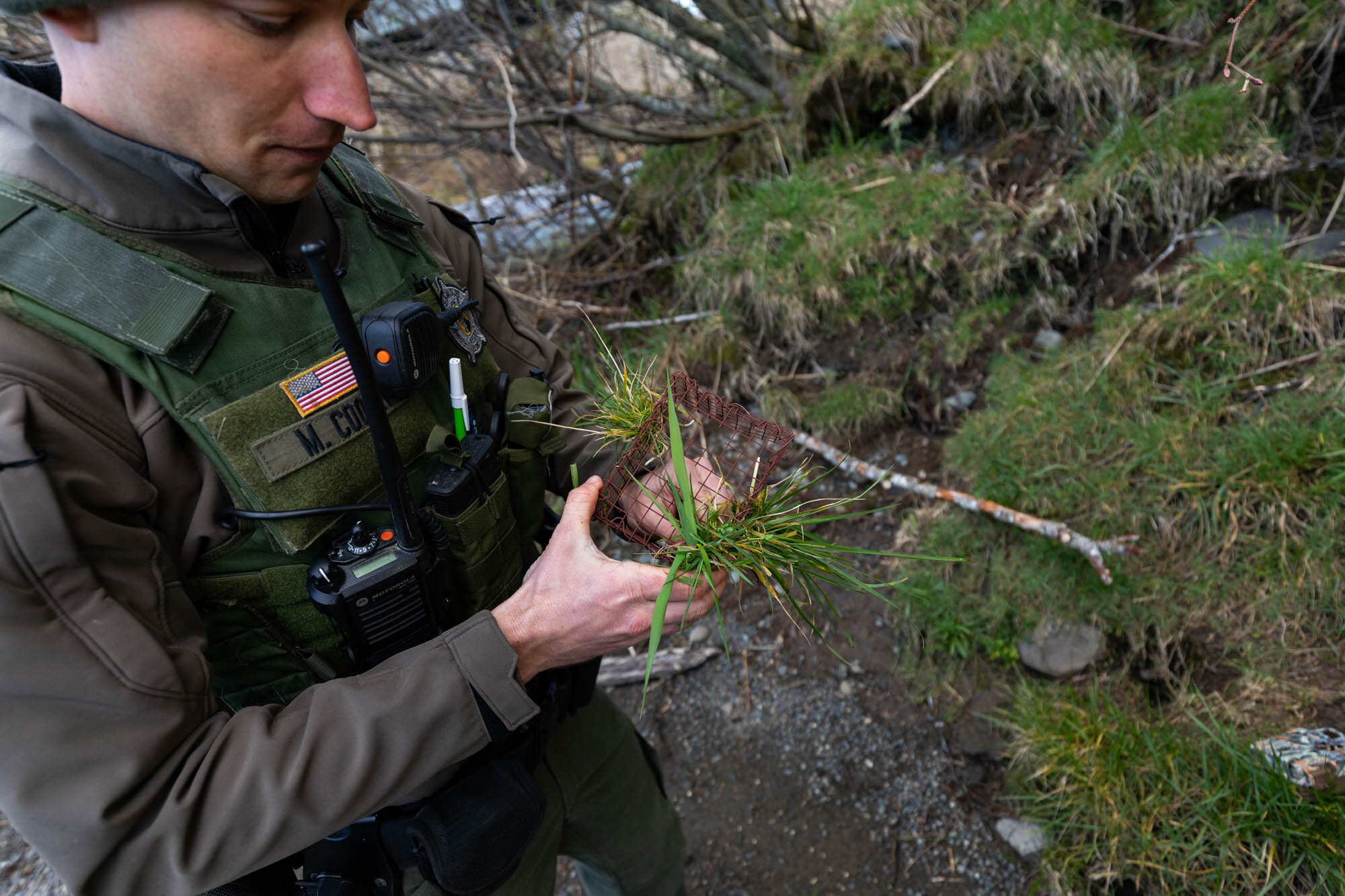
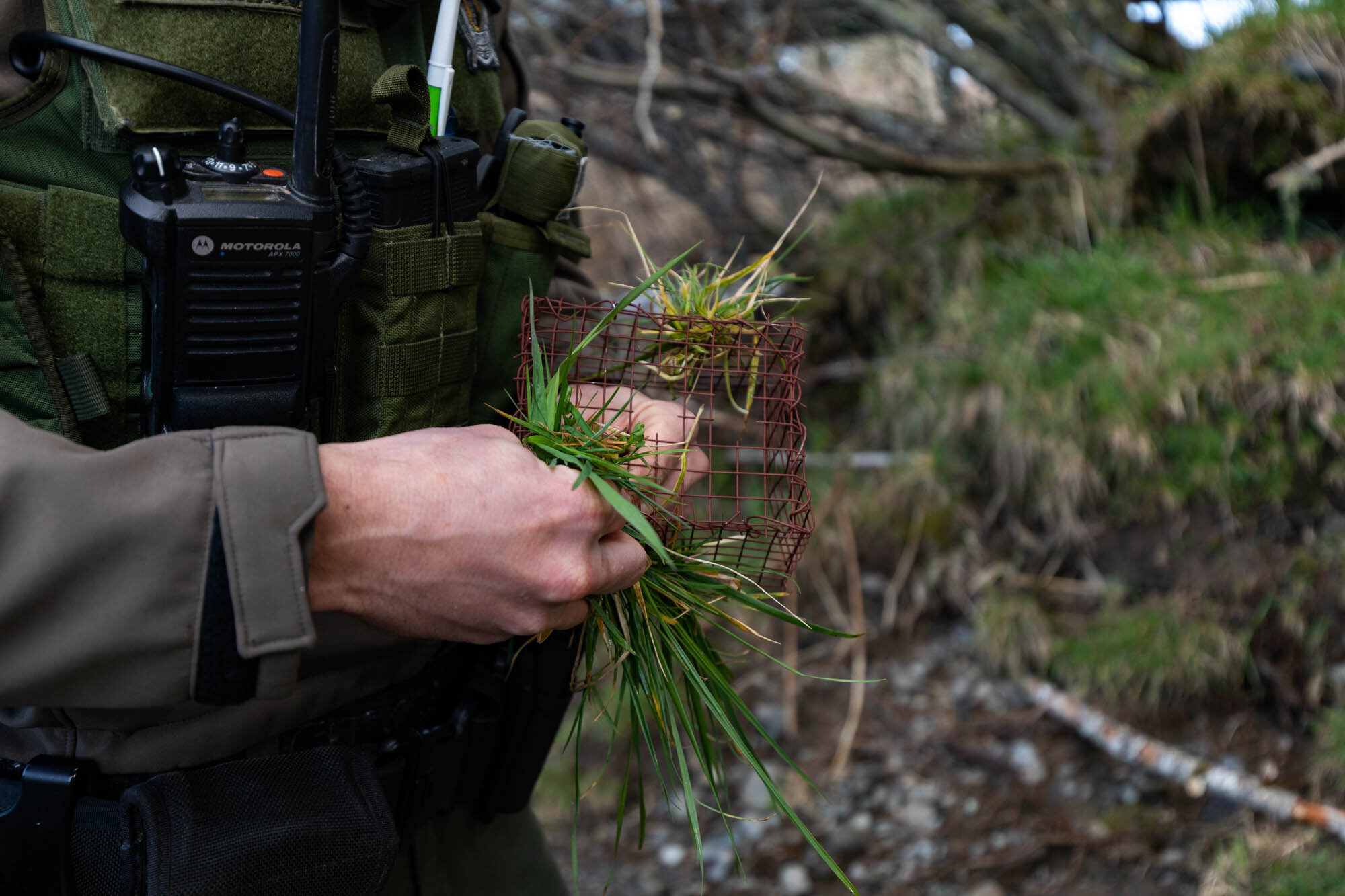
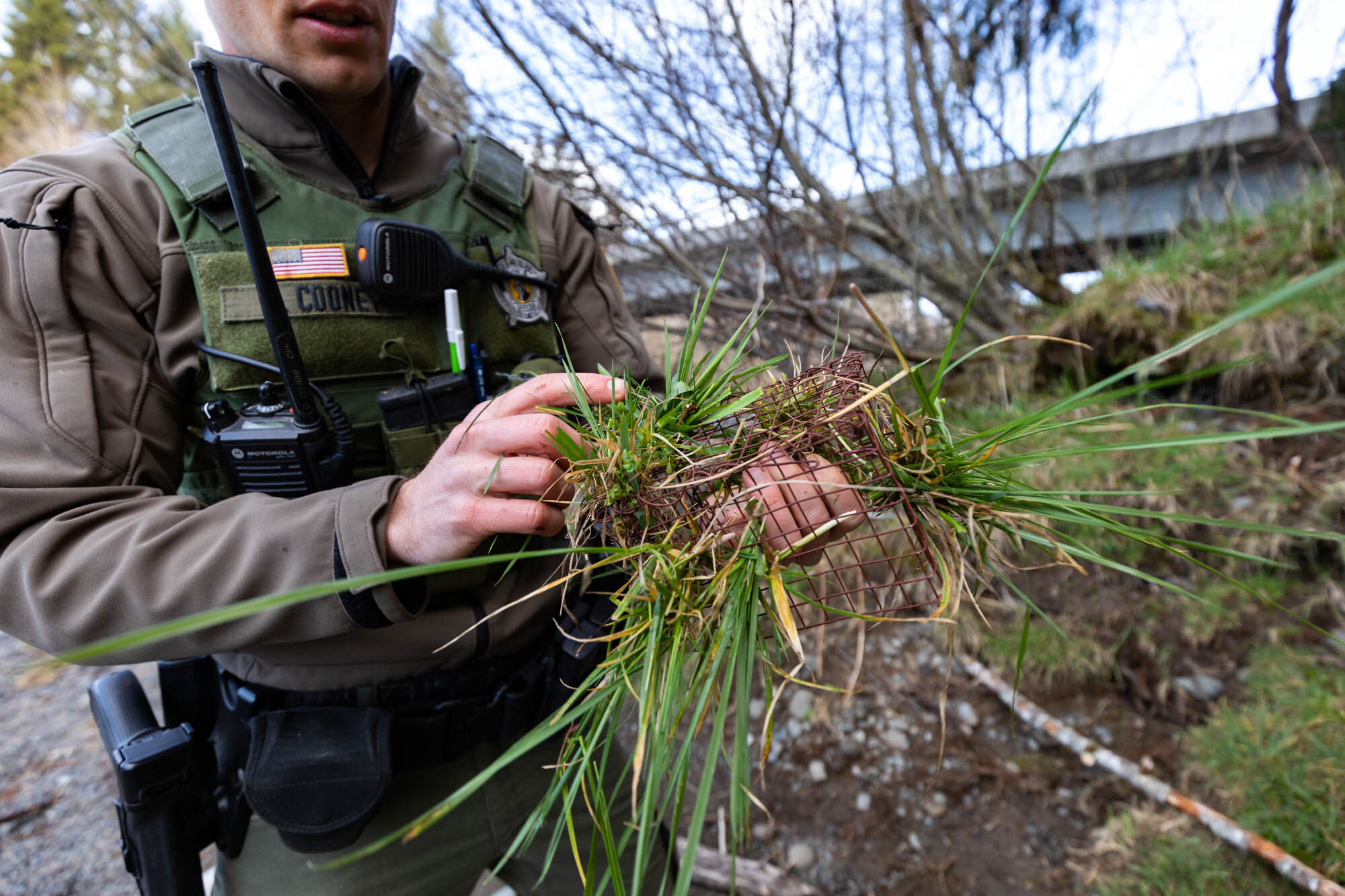
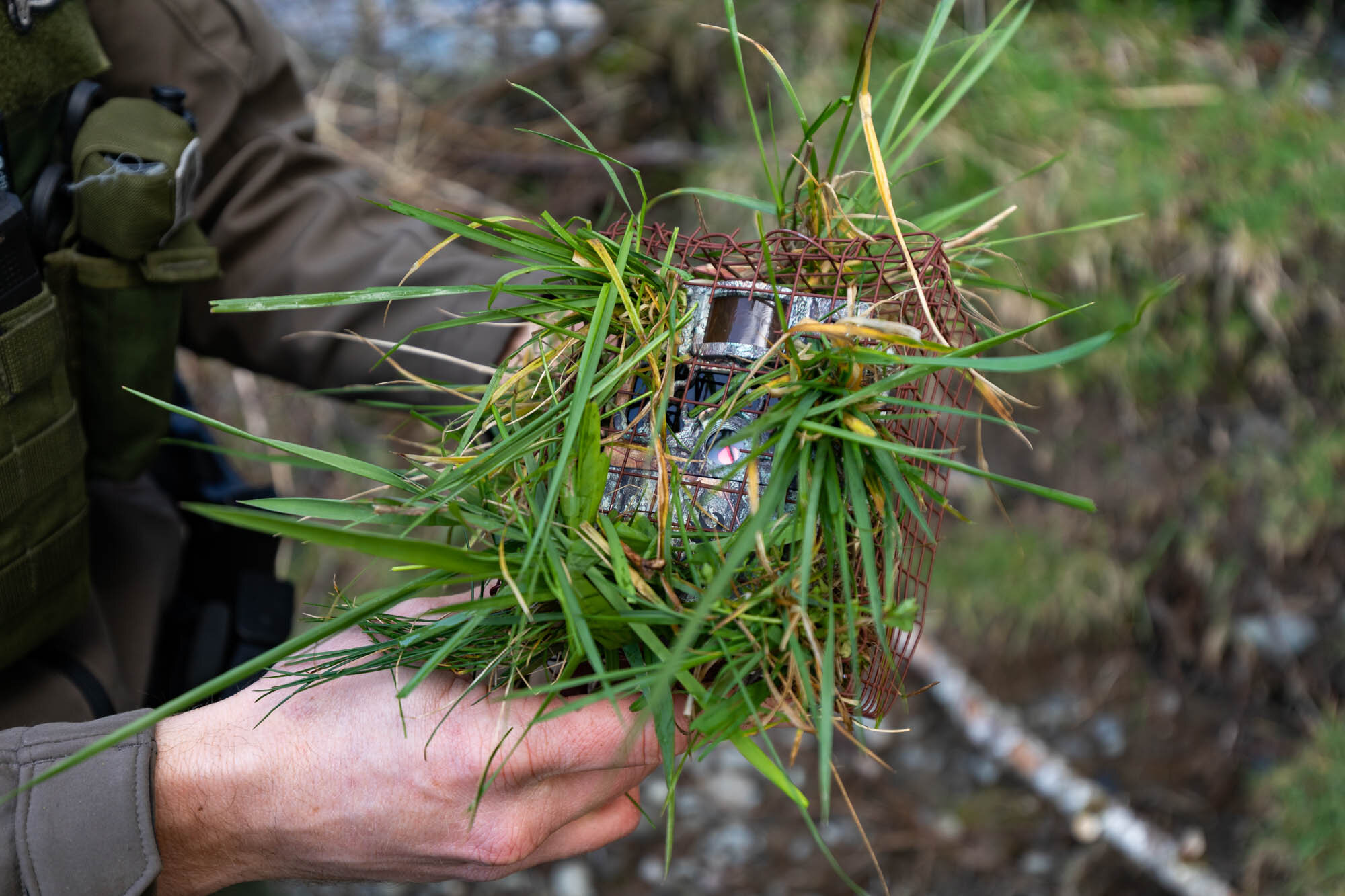
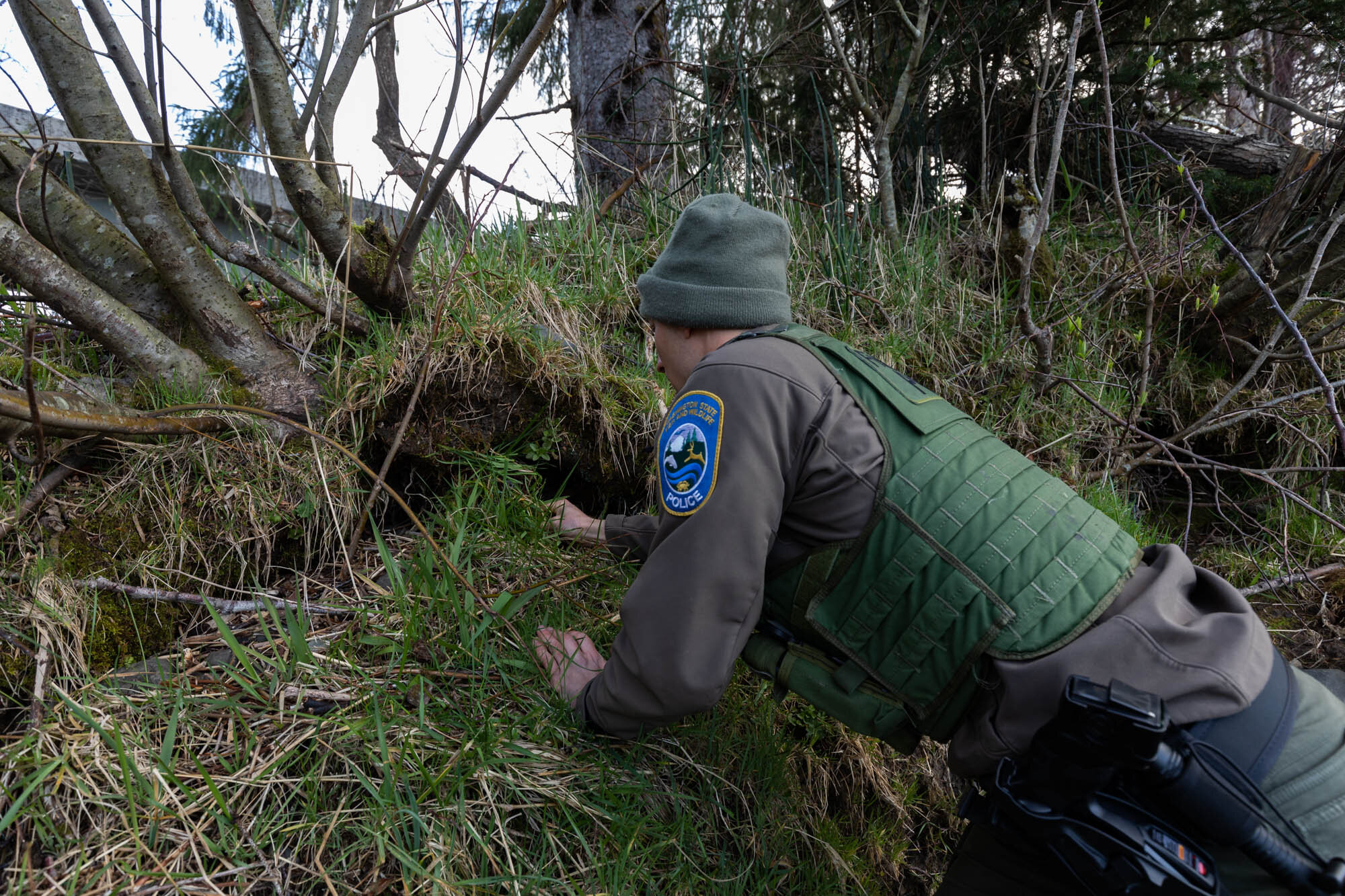
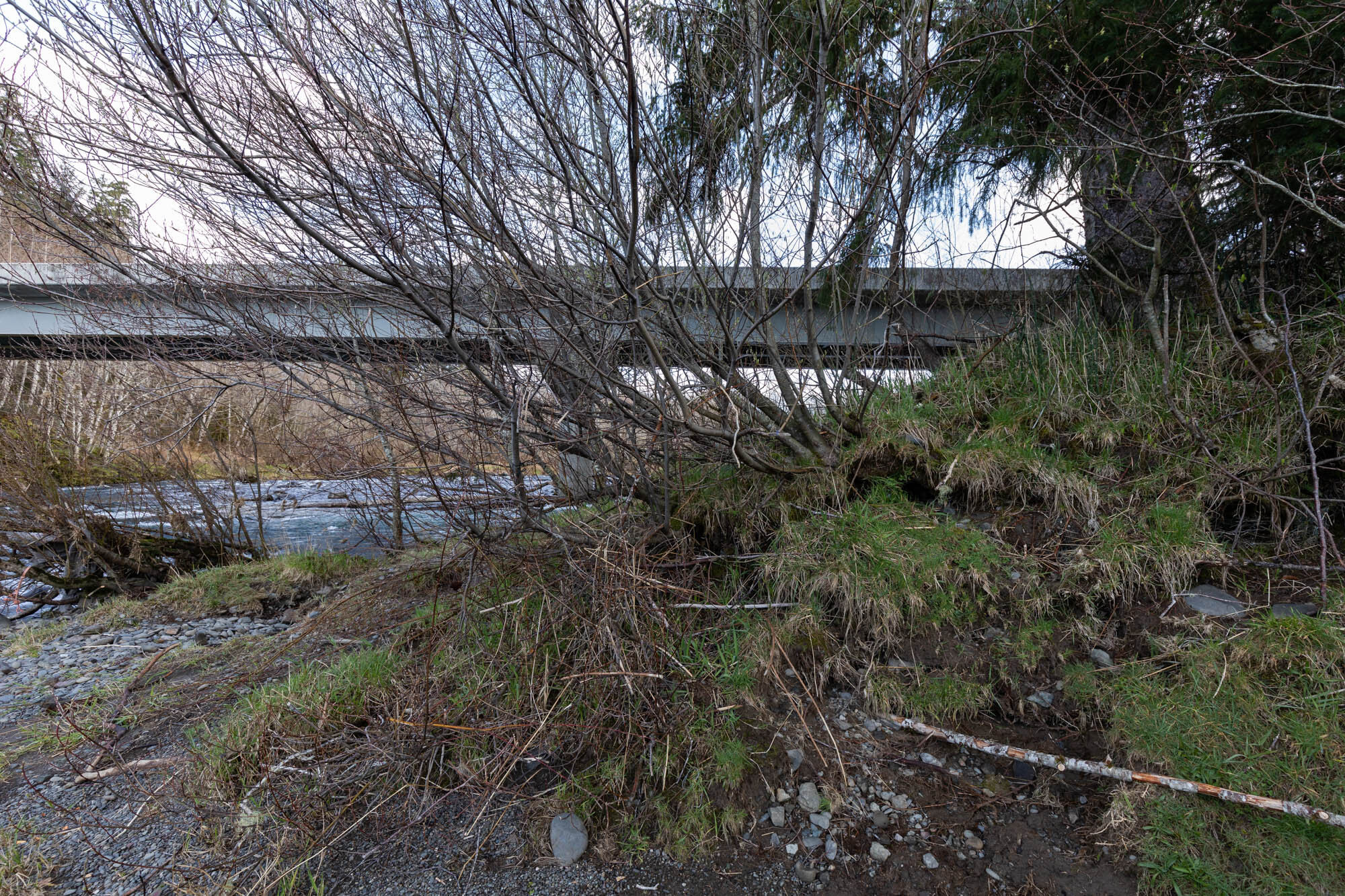
Eyes in the Woods: Game Cameras Increase Law Enforcement’s Presence
The new raft certainly increases the effectiveness of Law Enforcement’s monitoring of the OP’s rivers, but the WSC is even more excited by the expanded reach the game cameras we donated have provided. Rosenberger had included them on his original wish list of equipment because they allow Law Enforcement to monitor multiple locations at once, especially at night, instead of committing Officers to long, sometimes multi-day, stake-outs hoping to catch poachers in the middle of illegal activity. If the poachers don’t show up on the same schedule, then Law Enforcement’s valuable time is wasted.
The cameras can be installed and hidden wherever illegal activity is suspected. They have motion sensors and don’t start recording until these are triggered. The recorded footage is great documentation of the crime and ideal evidence supporting a prosecution. The cameras are linked to the internet and immediately send a message to the Law Enforcement team’s phones when they start recording. This allows Law Enforcement Officers to wait off-site, or jump out of bed in the middle of the night, and race to the camera’s location to capture whoever set off the motion detector.
The cameras are already proving their worth and have been used widely across Olympic Peninsula rivers. Rosenberger described them as a game changer for his team. Over the time they’ve been deployed, Officers have made dozens of arrests of anglers fishing illegally on closed waters or at night. The cameras have been used to document and arrest multiple anglers intentionally snagging and keeping Salmon. Officers recently set up the cameras on the Dungeness River after they found an illegal gillnet that had been used to kill seven endangered wild Chinook Salmon. They were also crucial to the nighttime arrest of two poachers who were caught with a garbage can filled with thirty-five Coho Salmon they had caught illegally with dipnets on the Big Quilcene River.
Coho Salmon and dip nets confiscated from poachers.
Hidden game camera records a poacher with an illegal gill net and fish.
Protecting Washington’s Shared Natural Resources for the Future
There is no doubt that the WDFW Officers tasked with protecting the Olympic Peninsula’s fish, game and natural resources from poachers and abuse have a monumental job. It is difficult to overemphasize our appreciation for their professionalism and dedication. Usually the team consists of a half dozen Officers, but as of this writing, there are only four Officers to patrol all the land and rivers of Jefferson and Clallam Counties along with their surrounding coastline. It is unclear if these last two positions will be filled anytime soon because recently approved departmental budgets would actually eliminate a number of WDFW police Officer positions across the state because of a lack of available funding.
The iconic rivers of the Olympic Peninsula face a great number of challenges in the 21st Century. Wild Steelhead and Salmon runs are struggling. Many of the coast’s watersheds have missed spawning goals in recent years. Despite this, fishing on the OP remains more popular than ever. Anglers visit from across the region, country and world, and a large number of local and visiting guides operate their businesses on these public waters.
More than ever, we all need more of the returning wild Steelhead and Salmon to successfully reach their spawning gravel in order to rebuild their diminished populations. Poachers who kill large numbers of fish, or anglers who illegally keep a wild fish, are stealing from all of Washington’s anglers and citizens. They are also stealing from the future generations we all hope will still be able to fish these amazing waters for years to come.
The Wild Steelhead Coalition is proud to support the critical efforts of the WDFW’s Olympic Peninsula Law Enforcement Program. These Officers work day and night to protect our wild fish and we are happy to contribute to this important effort with much-needed equipment whenever possible. Our first round of gifts was donated at the end of 2019 and has already had a positive impact in the hands of the OP Law Enforcement. Inspired by this success, we are currently working closely with Rosenberger and his team to further expand their reach and effectiveness across the waters of the OP. The best way for us to help is to raise more funds to purchase another list of needed equipment and get this second large donation of additional cameras and other tools delivered to WDFW Police in early 2021, in time to support enforcement and monitoring during this year’s winter steelhead season on the coast.
We want to thank Officers Kit Rosenberger and Morgan Cooney for letting us tag along on a river patrol and showing us how the game cameras are used in the field. It was fascinating, and inspiring, to learn more about their efforts to protect Washington’s wild fish on the Olympic Peninsula’s rivers. While it is a privilege for the Wild Steelhead Coalition to call attention to their incredible work and help support the OP team with equipment donations, it is most important for us to remind the public, Department managers, and our elected leaders that the WDFW Police are responsible for public safety, safeguarding our natural resources, and enforcing hunting and fishing laws across vast amounts of land and water every single day. It is a huge responsibility.
Across Washington, they are the public’s first line of defense against fish and game poaching and they serve this role with tireless dedication. To honor this commitment, our elected officials and Department managers must make sure that WDFW’s Law Enforcement budgets are prioritized and their ranks filled, if not expanded, so that these dedicated Officers and public servants are able to fully carry out their mission on behalf of Washington hunters and anglers and every citizen who values our wild places and shared natural resources.
* * *
To help support the Wild Steelhead Coalition’s work to protect and restore wild steelhead and the rivers they depend upon, including our ongoing efforts to donate equipment to WDFW Law Enforcement, please consider making a tax-deductible contribution at our secure Donation page. We are a small, nonprofit, grassroots conservation organization committed to protecting and restoring wild steelhead across their native range. Our work depends on the generosity of our dedicated members, fellow anglers, and wild steelhead advocates. Thank you for your support!







